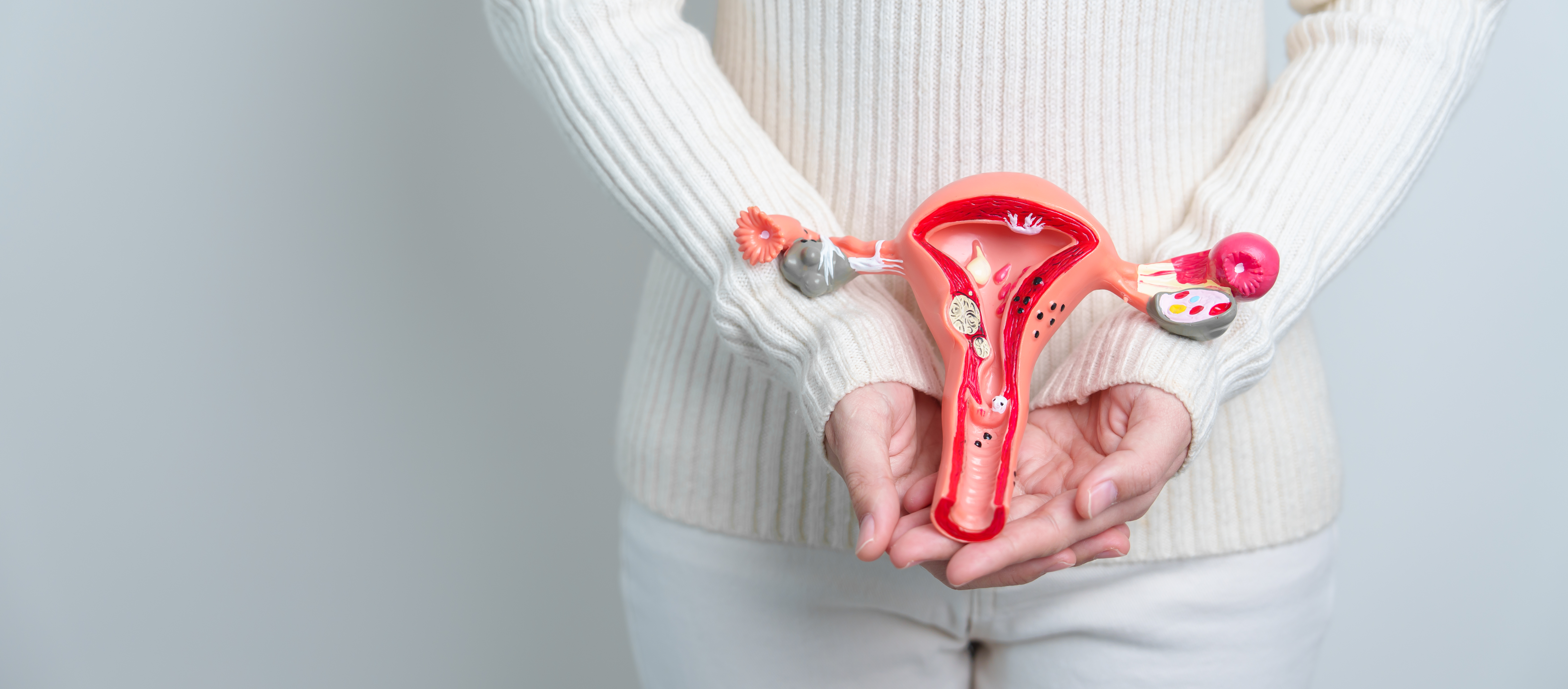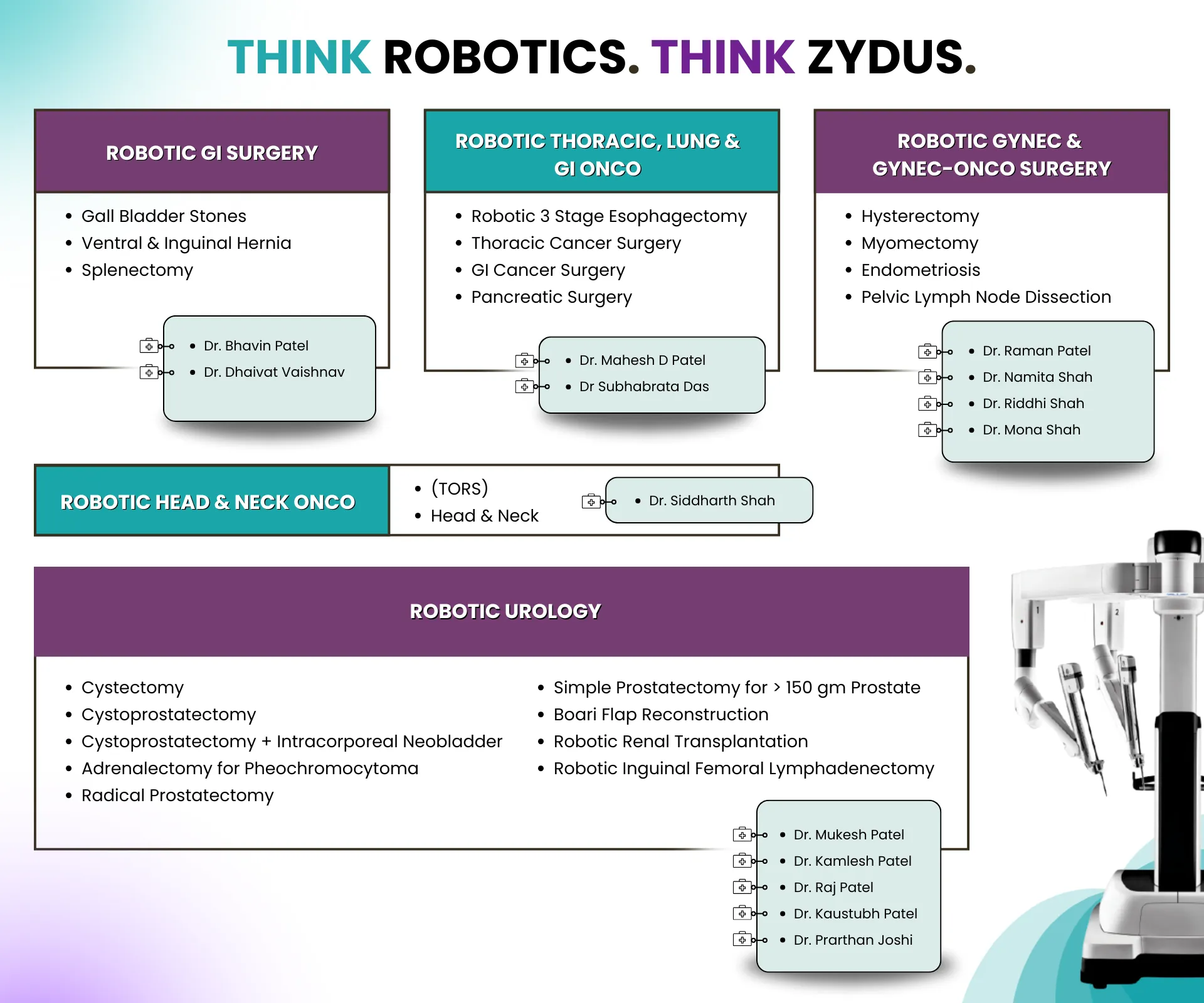
Expert Care for Gynec Issues
- Medical Specialities
- Obstetrics, IVF, Gynec and Gynec-Onco
- Gynaec Issues
Expert Care for Gynec Issues
At Zydus Hospitals, we understand that women face unique health challenges at different stages of life. From youth to marriage and motherhood, gynec issues can impact both physical health and emotional well-being. Our team of senior gynecologists and obstetrics experts ensures timely diagnosis, advanced treatment, and compassionate care tailored to each woman’s needs.
-
Polycystic Ovarian Syndrome (PCOS)
-
PCOS is one of the most common hormonal disorders affecting over 30% women of reproductive age in India. Common symptoms like irregular periods, difficulty conceiving, weight fluctuations, and excess hair growth are diagnosed at an early stage. Its classification is reflected as polycystic ovarian syndrome, ICD-10.
-
-
PCOS Symptoms and Treatment
-
In case you notice such symptoms, consulting the gynecologist is advisable.
-
Irregular or missed periods.
-
Excess hair growth or acne.
-
Difficulty managing weight.
-
Fertility challenges.
-
Uncontrollable hair growth on the face, chest, or back.
-

-
At Zydus Hospitals, we provide holistic care addressing both short-term discomfort and long-term complications. Our PCOS treatment includes:
-
Lifestyle modification and dietary support.
-
Hormonal medicines for cycle regulation.
-
Fertility-focused therapies for couples planning pregnancy.
-
We are recognized among the PCOS best treatment hospitals for offering evidence-based, patient-friendly care.
- PCOS pain treatment: To relieve cramps and pelvic pain through medication and lifestyle guidance.
- PCOS treatment for teenagers: Gentle management focusing on early intervention and long-term health.
- Best treatment for PCOS in India: Combining modern medicine with preventive care to give women lasting solutions
- PCOS permanent treatment: Though there is no absolute cure, our specialists aim for long-term control and improved quality of life
If you are struggling with continuous PCOS problem symptoms, our experts will recommend the best treatment for PCOS based on your age, medical history, and family planning goals.
-
Endometriosis and Fibroids
-
Not all gynec problems are the same; conditions like endometriosis and fibroids can also cause pain, heavy bleeding, and fertility difficulties. Endometriosis is a medical condition where the uterine lining develops outside the uterus. Whereas, Fibroids are benign lesion that forms inside the uterus.
-
-
Symptoms for Endometriosis may include:
-
Painful periods
-
Pain in the lower part of the belly (pelvis), during intercourse, or while urinating or passing the bowels
-
Heavy bleeding during periods with clots
-
Bloating
-
Nausea
-
Fatigue
-

- Clinical Examination
- Sonography
- MRI
- Diagnostic Laparoscopy is also done in some cases
- Painkillers
- Hormonal suppression
- Fertility treatment
- Surgery to remove the endometriotic lining
While the exact cause of endometriosis remains unidentified, symptom management is possible through medication or, in certain instances, surgical intervention.
-
Fibroids
-
Fibroids are benign lesion that forms inside the uterus. They often vary in size. They are common among Indian women. The chances of fibroids turning cancerous are less than 1%. The common types of fibroids are :
-
Intramural fibroids:
can be found in the muscle wall of the uterus and can often grow larger
-
Submucosal fibroids:
develop in the middle muscle layer (myometrium) of the uterus and aren’t very common
-
Subserosal fibroids:
form outside the uterus.
-
Though these are not life-threatening, they can significantly affect one’s quality of life.

- Heavy bleeding during periods
- Longer periods
- Excessive menstrual cramps
- Pressure or a feeling of fullness in the lower abdomen
- Frequent urination
- Pain during intercourse
- Fertility problems
- Clinical Examination
- Routine Sonography
- Pelvic Sonography
- Pelvic CT Scan or MRI
Frequent sonographies are recommended even in the reproductive age groups to detect fibroids and monitor if they are growing in size. So for any irregular periods, heavy or light, a consultation from a Gynaecologist is highly recommended.
Gynec problem solutions provided by experts at Zydus Hospitals include medication, minimally invasive surgery, and long-term care strategies. Our doctors provide clear guidance so that women understand both the diagnosis and the treatment plan.
-
Common Gynec issues after Marriage
-
Marriage can bring new concerns due to lifestyle changes, intimacy, and family planning decisions. Many women visit our specialist to consult for different gynec problems, such as:
-
Pain during intercourse
-
Irregular menstrual cycles
-
Vaginal infections
-
Fertility difficulties
Gynec problem solutions provided by experts at Zydus Hospitals include medication, minimally invasive surgery, and long-term care strategies. Our doctors provide clear guidance so that women understand both the diagnosis and the treatment plan.

At Zydus Hospitals, we believe every woman deserves the right care at the right time. Whether you are looking for the best treatment for PCOS, struggling with endometriosis, fibroids or seeking guidance for consultation for gynec problem, our team is here to help.
Book an appointment today and take the first step toward a healthy life.

Search Doctor / Diseases
